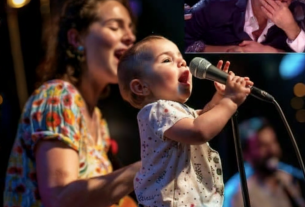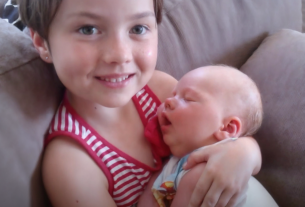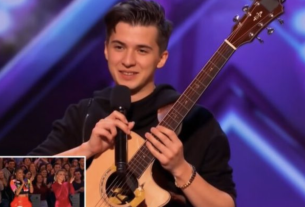Oh, what an incredible portrait you chose… An oak frame, with carved edges, as if taken from an ancient castle. Must have cost a fortune.”
Oleg’s voice—my husband, father of my children, the man I had shared a bed, dreams, and years with—came from the tiny laptop speaker, seeping into the room with a faint hiss of static, as though reality itself were trying to muffle what I was about to hear. Each word felt like a drop of ice water on bare skin. Cold. Merciless. Emotionless.
I sat in this bland, anonymous little nest I’d been renting for the past three months—a place with no soul, no scent, no trace of me. Just gray-painted walls and a view of the autumn park outside, where leaves, like the last remnants of memory, drifted slowly to the ground. In my hands was a cup of Americano. Long cold. Like everything inside me.
On the screen—a live stream. A farewell ceremony.
For me.
But I wasn’t dead.
I was watching.
It was my experiment. My insane, desperate, cruel experiment teetering between psychosis and truth. I had paid a man—a professional illusionist—an entire year’s salary to create the perfect spectacle of my death. The funeral. The mourners. The sad looks. The funeral wreaths. All of it—like in the movies. Only without a script. Only with real people who, in their minds, were grieving for me.
But I was watching. I could see.
On the screen—Vera, my sister, shivered as if from cold and adjusted the black scarf on her head. Her movements were mechanical. Artificial.
“Oleg,” she said, “she would have appreciated this.”
I squeezed the cup. Nearly crushed it. And in that moment—I laughed. Bitterly. Through clenched teeth. Yes, I would have appreciated it. I would have appreciated it if even one of them had been truly torn apart by grief. If the tears had been real, not staged. If the mourning wasn’t just a mask you put on for a funeral, like a black suit.
But no. They stood there as if at some dreary meeting. As though fulfilling a duty. As though I wasn’t a person, but an obligation that had finally expired.
Kira—my sixteen-year-old mirror image, with my eyes and my lips—stood off to the side. Her head was lowered. But not in prayer. Not in grief. In her phone. Her fingers darted across the screen. I could almost hear her typing: “God, what a boring day. Black doesn’t suit me at all. Why can’t we just leave?”
Anton—nineteen, tall, with my forehead and his father’s gaze—was looking off into the distance. At the crows perched on the bare birch branches. His face—a stone. No emotion. No pain. No sense of loss. As if he were watching someone else’s life, someone else’s death.
“After the funeral we’ll stop by the office and pick up her things,” Oleg said, casually, as if discussing a cleaning schedule. “And sort out the car documents. You don’t need it anyway, but we’ll still have to pay the tax.”
Anton nodded. Just nodded. No words. No glance. No smallest sign that he had lost his mother. Only the businesslike acceptance of a fact. As if it were about transferring ownership of a parking spot.
I zoomed in on Oleg’s face. His eyes. His lips. His hands. He was… calm. Maybe tired. But not broken. Not shattered. Where was the storm they show in films? Where was the cry from the soul? The despair? The “I can’t live without her”? The “Why did she have to go?”?
Nowhere.
I had set all this up to see the truth. My psychiatrist called it “a radical search for confirmation.” I called it my last chance to stay sane. My last attempt to understand: was I to them truly me—a living, loving, suffering woman—or just a function? An ATM. An organizer. A housekeeper. A woman you could replace like a burned-out light bulb.
And here was the answer. Clear. Brutal. Unvarnished.
Vera walked over to the kids. Said something quietly. Kira grimaced as if swatting away an annoying fly, shoved her phone in her pocket, and looked up. At me? No. At her aunt. Her eyes—not wet. Not red. Not from crying. From irritation. From boredom.
I had always thought I was the glue. That without me their world would fall apart. That I was the heart of the home, its pulse, its rhythm. But they stood there talking about car paperwork. As though I were not a human being, but property to be re-registered.
The speaker began his speech. I turned the volume down. Words like “she was a light”, “her kindness warmed us all”, “she will remain in our hearts” became a mockery. A lie. A farce. I looked at them and felt ice spreading inside me. I had not been a light. I had been background. A convenient part of the décor. And now that part was gone, they were simply thinking about how to move on. Without excess feeling. Without excess words.
That evening I switched to the house cameras. My spy center. My theater of the absurd. My personal torture.
They came home. Oleg walked into the apartment without even taking off his coat. Went into the kitchen. Opened the fridge. Stood there. Closed it.
“There’s nothing to eat,” he said, as if it were a crime.
Kira dumped her bag in the hallway.
“Dad, let’s order pizza? I’ve got a promo code.”
No one said, “Mom always left dinner ready.” No one remembered how every Friday I made pasta with pesto. No one sighed about how the kitchen—the heart of the home—was now just a room where the food had run out.
An hour later they were in the living room. Pizza boxes on the table. A stupid sitcom on the TV. They laughed. All three. Even Oleg. Even Anton. Even Kira.
I watched. And I felt no pain. I felt cold. A cold that seeped into my bones, my heart, my soul. I had expected to see longing. Awkward hugs. Tears choked back over dinner. But I saw… relief. As if the strict schoolteacher who always demanded order, cleanliness, discipline had been removed from the house. As if a weight had been lifted.
A week passed.
The house turned into a dump.
A mountain of dishes in the sink—like a monument to my absence. Anton tried to do laundry—and flooded the neighbors. Oleg yelled at him not because he ruined clothes, but because now he would have to apologize. Solve problems.
His mother called. Oleg put her on speaker.
“So, how are you holding up, son?”
“We’re fine, Mom. Coping,” he said, almost cheerfully. “It’s even quieter now. You know how Lena liked everything her way. Step out of line and—bang.”
I closed my eyes.
Quieter now.
That’s what they called my love. My care. My effort to create comfort. My rules. My pain. Bang.
Late that night, when the kids were gone, Oleg stayed alone. He didn’t take out the photo album. Didn’t look at our wedding pictures. Didn’t remember.
He opened his laptop. Started searching—how much cars like mine were going for. Pragmatic. Businesslike. As if I were not a person, but an asset to be valued.
I switched to the camera in my bedroom.
The door opened. Kira walked in. Went to the vanity. Picked up my favorite perfume bottle. Freedom, it was called. I held my breath. Maybe this was it? Maybe she would feel me? Remember?
She sprayed it on her wrists. Twirled in front of the mirror. Smiled. Then opened the jewelry box. Took out a gold chain. Thin. The one Oleg gave me after she was born. Tried it on. And said aloud, “Looks good.”
That’s when I understood: they weren’t mourning. They were dividing trophies.
Three weeks passed.
On Friday evening Oleg was pacing in the living room. Smiling. A smile I hadn’t seen in years. Tender. Anticipatory.
“Yes, of course, I’m waiting,” he said. “The kids are with friends. The house is all ours.”
My heart stopped.
An hour later—the doorbell.
On the doorstep—Marina. His colleague. With the predatory smile I had always hated. She came in. Into my house. My fortress. With a bottle of wine.
Oleg took out my wine glasses. The thin crystal ones I had spent a year choosing. Poured the wine. They sat on my couch.
“Finally,” Marina said, sipping. “I thought you’d never have the courage. Your Lena was so… proper. I was a little afraid of her.”
“She was… complicated,” Oleg replied evasively.
They talked about me. In my house. Drank from my glasses. Laughed. Flirted.
And in that moment, everything inside me shifted. The cold turned to fire. Fire of rage. Anger. Pain. This was desecration. Desecration of my life, my years, my tears, my love.
Marina ran her hand along his shoulder.
“But now everything’s different. Now you have me.”
Click.
The limit was reached.
I slammed the laptop shut. Observation over.
And then came clarity. Cold. Icy. Crystal.
I opened another laptop. Entered passwords. On the screen—our account. Our—an illusion. Ninety percent of the income—mine. My nights. My projects. My successes.
I was the primary owner. Oleg had once laughed: “Your whims again.”
I looked at the number. My labor. My sleepless nights. One click. Another. Entered the sum.
Confirmation.
I transferred almost everything to my secret account. Left them just enough to pay utilities. Not a penny more.
I stood. Went to the window. In the house opposite—my house, inherited from my parents, which I had never re-registered—the lights were on.
In there, another woman was drinking my wine. Sitting on my couch. Talking about my life.
And for the first time in a long time—I smiled.
The show was over.
The lesson was beginning.
In the morning Oleg tried to buy a coffee machine. Payment declined. He opened the app. His face—horrified. Eyebrows—up to his hairline. Panic. Calls to the bank. Accusations of hacking. Marina watching him suspiciously.
By evening they understood.
The money wasn’t coming back.
And then the real mourning began. Not for me. For the lifestyle.
Kira cried—not for her mother. For her courses. Her phone. Anton paced the apartment. Oleg sat on the couch, head in hands.
There it was. True grief. Not for a person. For comfort.
I waited until midnight.
And sent one message. From a new number.
“Liked the surprise?”
Attached a photo. Fresh. Me on the beach. In sunglasses. Smiling.
He read it. His face—white. With rage. He called. I hung up.
Second message:
“The apartment is mine. You have one week to move out. Take your things. Not mine.”
I turned off the phone. Turned off the cameras.
Enough.
A month later I sat in my therapist’s office.
I told him everything.
“You got what you wanted,” he said. “You proved their indifference was real. How do you feel now?”
“Empty,” I said. “I won. But in this war, there were no prisoners. Only ashes. Only scorched earth.”
“It was an extreme defense,” he said. “Your pain sought proof of their lack of love. But what you saw… doesn’t negate—”
I looked at my phone.
Dozens of missed calls. Messages. Rage. Pleas. Threats.
Maybe they did love me. In their own way. Not the way I needed.
Or maybe not.
Now I’ll never know.
I burned every bridge myself—just to see who would try to swim across.
No one did.
They only shouted from the other shore.
I stepped outside.
Sun. Light. Life.
I had the truth. Horrible. Disgusting.
But it was just as poisonous as the lie I had been living in.
I gained control.
But paid for it with absolute loneliness.
And now—it’s not at all clear—whether this was a victory…
Or just a transfer to another cell.



